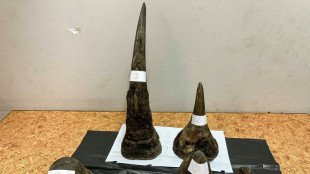
-
 US singer leaves talent agency after CEO named in Epstein files
US singer leaves talent agency after CEO named in Epstein files
-
Skipper Marsh tells Australia to 'get the job done' at T20 World Cup

-
 South Korea avert boycott of Women's Asian Cup weeks before kickoff
South Korea avert boycott of Women's Asian Cup weeks before kickoff
-
Barcelona's unfinished basilica hits new heights despite delays

-
 Back to black: Philips posts first annual profit since 2021
Back to black: Philips posts first annual profit since 2021
-
South Korea police raid spy agency over drone flight into North

-
 'Good sense' hailed as blockbuster Pakistan-India match to go ahead
'Good sense' hailed as blockbuster Pakistan-India match to go ahead
-
Man arrested in Thailand for smuggling rhino horn inside meat

-
 Man City eye Premier League title twist as pressure mounts on Frank and Howe
Man City eye Premier League title twist as pressure mounts on Frank and Howe
-
South Korea police raid spy agency over drone flights into North

-
 Solar, wind capacity growth slowed last year, analysis shows
Solar, wind capacity growth slowed last year, analysis shows
-
'Family and intimacy under pressure' at Berlin film festival

-
 Basket-brawl as five ejected in Pistons-Hornets clash
Basket-brawl as five ejected in Pistons-Hornets clash
-
January was fifth hottest on record despite cold snap: EU monitor

-
 Asian markets extend gains as Tokyo enjoys another record day
Asian markets extend gains as Tokyo enjoys another record day
-
Warming climate threatens Greenland's ancestral way of life

-
 Japan election results confirm super-majority for Takaichi's party
Japan election results confirm super-majority for Takaichi's party
-
Unions rip American Airlines CEO on performance

-
 New York seeks rights for beloved but illegal 'bodega cats'
New York seeks rights for beloved but illegal 'bodega cats'
-
Blades of fury: Japan protests over 'rough' Olympic podium

-
 Zelensky defends Ukrainian athlete's helmet at Games after IOC ban
Zelensky defends Ukrainian athlete's helmet at Games after IOC ban
-
Jury told that Meta, Google 'engineered addiction' at landmark US trial

-
 Despite Trump, Bad Bunny reflects importance of Latinos in US politics
Despite Trump, Bad Bunny reflects importance of Latinos in US politics
-
Epstein accomplice Maxwell seeks clemency from Trump before testimony

-
 Australian PM 'devastated' by violence at rally against Israel president's visit
Australian PM 'devastated' by violence at rally against Israel president's visit
-
Vonn says suffered complex leg break in Olympics crash, has 'no regrets'

-
 Five employees of Canadian mining company confirmed dead in Mexico
Five employees of Canadian mining company confirmed dead in Mexico
-
US lawmakers reviewing unredacted Epstein files

-
 French take surprise lead over Americans in Olympic ice dancing
French take surprise lead over Americans in Olympic ice dancing
-
YouTube star MrBeast buys youth-focused banking app

-
 French take surprise led over Americans in Olympic ice dancing
French take surprise led over Americans in Olympic ice dancing
-
Lindsey Vonn says has 'complex tibia fracture' from Olympics crash

-
 US news anchor says 'hour of desperation' in search for missing mother
US news anchor says 'hour of desperation' in search for missing mother
-
Malen double lifts Roma level with Juventus

-
 'Schitt's Creek' star Catherine O'Hara died of blood clot in lung: death certificate
'Schitt's Creek' star Catherine O'Hara died of blood clot in lung: death certificate
-
'Best day of my life': Raimund soars to German Olympic ski jump gold

-
 US Justice Dept opens unredacted Epstein files to lawmakers
US Justice Dept opens unredacted Epstein files to lawmakers
-
Epstein taints European governments and royalty, US corporate elite

-
 UK PM Starmer refuses to quit as pressure builds over Epstein
UK PM Starmer refuses to quit as pressure builds over Epstein
-
Three missing employees of Canadian miner found dead in Mexico

-
 Meta, Google face jury in landmark US addiction trial
Meta, Google face jury in landmark US addiction trial
-
Winter Olympics organisers investigate reports of damaged medals

-
 Venezuela opposition figure freed, then rearrested after calling for elections
Venezuela opposition figure freed, then rearrested after calling for elections
-
Japan's Murase clinches Olympic big air gold as Gasser is toppled

-
 US athletes using Winter Olympics to express Trump criticism
US athletes using Winter Olympics to express Trump criticism
-
Japan's Murase clinches Olympic big air gold

-
 Pakistan to play India at T20 World Cup after boycott called off
Pakistan to play India at T20 World Cup after boycott called off
-
Emergency measures hobble Cuba as fuel supplies dwindle under US pressure

-
 UK king voices 'concern' as police probe ex-prince Andrew over Epstein
UK king voices 'concern' as police probe ex-prince Andrew over Epstein
-
Spanish NGO says govt flouting own Franco memory law


Why Greeks still love their smashing nights out
A Greek crooner is showered in red and pink carnations by customers in an Athens taverna as they sway to his songs of love and passion.
But suddenly the flower-throwing of fans in high heels and sparkly lame outfits gives way to a wild crescendo of plate smashing.
Piles of crockery are broken at the singer's feet -- a decades-old tradition of late-night folk revelry that has survived dictatorship, the Greek debt crisis and now Covid.
"The Greek mentality is different from that of foreigners. When it comes to entertainment... you have to have a lot of noise," said Christos Gounaris, who manages singers on the Athens folk scene.
It is the night of the Epiphany, a major religious holiday in Greece, and large tables are set out in front of the stage of the tavern in Peristeri in the working-class west of Athens.
Late-night bouzouki taverns like this named after the lute-like instrument originally brought over by Greek refugees from what is now modern Turkey in the 1920s.
The singer in the leopard-print shirt bringing the place to its feet is Pavlos Spiropoulos, who drives a truck during the week and sings long, tragic love songs at the weekend.
"When people throw plates and flowers at me I feel happy, because I feel I'm doing a good job and that the public loves me," said the 51-year-old, who has been singing since the age of 18.
- 'Let off steam' -
Breaking plates "is a way for customers to let off steam", adds the tavern's 56-year-old owner Vassilis Miggas.
"It's also a way to show the singers: 'You're good, I like that!'" he told AFP.
"We throw flowers and plates for those who put the most passion" into their performance, said Gounaris.
Plates are also broken at weddings to bring good luck to the bride and groom, or at christenings.
For some, breaking plates and throwing flowers is a way of showing wealth and social status. But now they are often included in the bill, costing the owners three euros or so a dozen before tax.
The practice reached its zenith in the 1960s, its popularity bolstered by appearances in iconic films such as "Never on Sunday" starring legendary Greek actress Melina Mercouri, with its theme song winning an Oscar in 1961.
At the time, 100,000 plates were broken every month and dozens of small companies sprang up to mass produce the made-to-break crockery, according to the Piata yia spasimo company, whose name means "Plates for smashing".
Based in nearby Piraeus, the family-run company, founded over 40 years ago, is one of the very last still making these plaster plates.
There is no definitive theory on the origins of the custom.
Gounaris said it evolved in the 1930s out of a previous tradition of knife-throwing.
"But people got hurt," he said, with patrons then throwing balloons and chocolates before settling on plates.
- 'We forget our problems' -
Today the tradition is also a draw for tourists in some of the taverns in Athens's historic district of Plaka, or on islands popular with revellers such as Mykonos.
But it has also clung on among Greeks, weathering the ups and downs of the country's history even if it has lost some of its popularity amid safety concerns for artists.
Banned by the military dictatorship that seized power in 1967, Greeks started smashing plates again as soon as democracy was restored in 1974.
The squeeze on incomes during the near-decade-long Greek debt crisis was a blow, as was the Covid pandemic that forced restaurants, bars and entertainment venues to close for months.
But Spiropoulos is not worried.
"We're full (tonight)," he said.
In Greece "we drink, we go out to forget our problems!" he shouted.
K.AbuDahab--SF-PST
